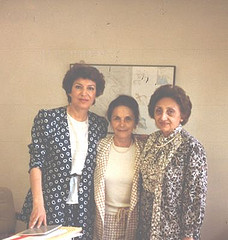 The revolutionary government banned books of fiction and poetry, including the works of Ferdowsi and Hafez, Iran’s most revered poets. They made music and dance illegal. School books were changed to offer a revisionist history of Iran. Hundreds of thousands of Iranians moved abroad.
The revolutionary government banned books of fiction and poetry, including the works of Ferdowsi and Hafez, Iran’s most revered poets. They made music and dance illegal. School books were changed to offer a revisionist history of Iran. Hundreds of thousands of Iranians moved abroad.
Mahnaz worked with colleagues from the National University of Iran to set up an institution to help counter these developments. In 1981, with an endowment provided by Princess Ashraf Pahlavi, the Foundation for Iranian Studies was established as an educational and research center dedicated to the preservation, study, and transmission of Iran’s cultural heritage.
Throughout the years, the Foundation, now the oldest institution of its kind in the United States, has organized countless seminars, lectures, film screenings, musical concerts, and painting exhibitions, and created an archive of 180 oral history interviews with key decision makers in a wide range of fields. In addition to publishing Iran Nameh, a prestigious quarterly journal of Iranian studies, FIS awards an annual prize to the best Ph.D. dissertation on Iranian studies and publishes ground breaking research on Iran.
In a tumultuous period of Iranian history that has created fierce partisan attitudes, the work of the Foundation continues to enjoy the support of researchers, writers, artists, and public figures from all backgrounds and political persuasions.
Read on: Taking It Global
